At the 1907 premiere of Richard Strauss’ Salome at the Metropolitan Opera, Louisa Pierpont Morgan, daughter of J.P. Morgan, the famous American financier and an influential member of the Met’s board, was so outraged at the title character kissing the severed head of John the Baptist that the opera was pulled after a single performance. It was effectively banned from the Met, exiled until 1934. I wonder what she’d have thought of Claus Guth’s new production.
Rather than the usual clarinet slither, Guth begins with the tinkling sound of the Dance of the Seven Veils played on a music box. A little girl, dressed in a black velvet dress with a white collar, plays with a doll. Her face darkens, she rips off its arms and smashes it into the floor. We are in a stark Victorian mansion, set in the era of the opera’s composition. Guth reimagines Strauss’ opera as an intense fin de siècle thriller… but you don’t need to be Sigmund Freud to psychoanalyse this one.
As he does in many of his productions, Guth speculates beyond the libretto to imagine a backstory, a means of explaining a character’s behaviour, even if that runs counter to the opera’s traditional interpretation. This one works quite brilliantly. As in his Turandot (Vienna, 2023), he presents the title character as a victim of abuse. Salome has been sexually abused by her stepfather, Herodes, since childhood, incest which – judging by his actions at the start of the opera, dangling her white stocking – still continues.
Salome’s abuse has conditioned her into believing that sex will get her anything she wants. When she asks Narraboth to fetch Jochanaan from the cistern, she lays on her back and spreads her legs. She cannot comprehend that this same approach won’t work with Jochanaan and, when he rejects her, she doesn't know how to deal with it.
Étienne Pluss’ vast set makes full use of the Met’s stage lift. The cistern where Jochanaan is held prisoner is the mansion’s basement, Salome’s former nursery, dotted with childhood memorabilia. Salome is accompanied by half a dozen identically dressed “mini-me” clones. One sits sullenly, plucking the stuffing from her doll. Another rides a rocking horse into battle, waving a sword, Olaf Freese’s lighting creating a giant shadow (a familiar Guth tic). Some of rocafilm’s projections – snow? blood? – make little impact, at least on the cinema screen.
The Seven Veils are danced for Herodes, who wears a ram’s head as he is forced to watch a re-enactment of the ritual abuse inflicted upon her, rather like the play Hamlet stages to expose Claudius. Each Salome enters wearing a black veil which is removed – lifting the veil of secrecy – before they “dance” for Herodes’ double; the youngest holds a ballet pose to earn a sweetie, but successive Salomes grow increasingly traumatised by his physical threats until Salome No.7 – soprano Elsa van den Heever – rebels, takes the ram’s cane and stabs him.
Guth’s production was originally meant to open the 2021-22 season, starring Asmik Grigorian – a Met debut for both – but became a casualty of the pandemic reshuffle and was seen first at the co-producing Bolshoi Theatre in February 2021. When the Met severed relations with Moscow following Russia’s invasion of Ukraine, Guth’s staging had to be recreated from scratch.
Stepping into Grigorian’s shoes is no easy matter, but van den Heever threw herself into the action superbly. Her soprano is an alloy of iron and silver and her top notes sliced through the orchestra with ease, although her lower register lacked a little power, buried under the opulent playing of the Met Orchestra, Yannick Nézet-Séguin fully relishing the dissonance and decadence of Strauss’ overripe score.
Van den Heever’s disturbed Salome is childlike, mimicking gestures and replicating behaviour from her past. At one point, she jokes with an imaginary Herodes, putting a finger to her mouth to hush their “little secret”. She embraces Jochanaan’s head passionately, but not before she’s nuzzled into his neck cavity, smearing her mouth with his blood (much audience flinching around me in the cinema).
Chained in the basement and caked in chalk, Peter Mattei sang nobly as Jochanaan, his baritone still sounding incredibly smooth and beautiful (he turns 60 shortly). Piotr Buszewski sang cleanly as Narraboth, with Tamara Mumford an urgent page. Michelle DeYoung made Herodias less of a caricature than usual, slightly pale-voiced. Gerhard Siegel is still the finest Herodes around, his oily tenor suitably slippery. When he orders Salome to be killed, Herodes himself collapses dead, clutching his chest, leaving Salome to walk off into the moonlight. And probably straight onto Freud’s couch.

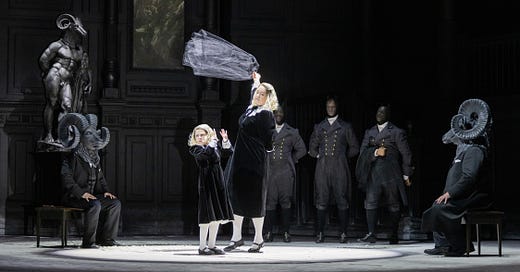



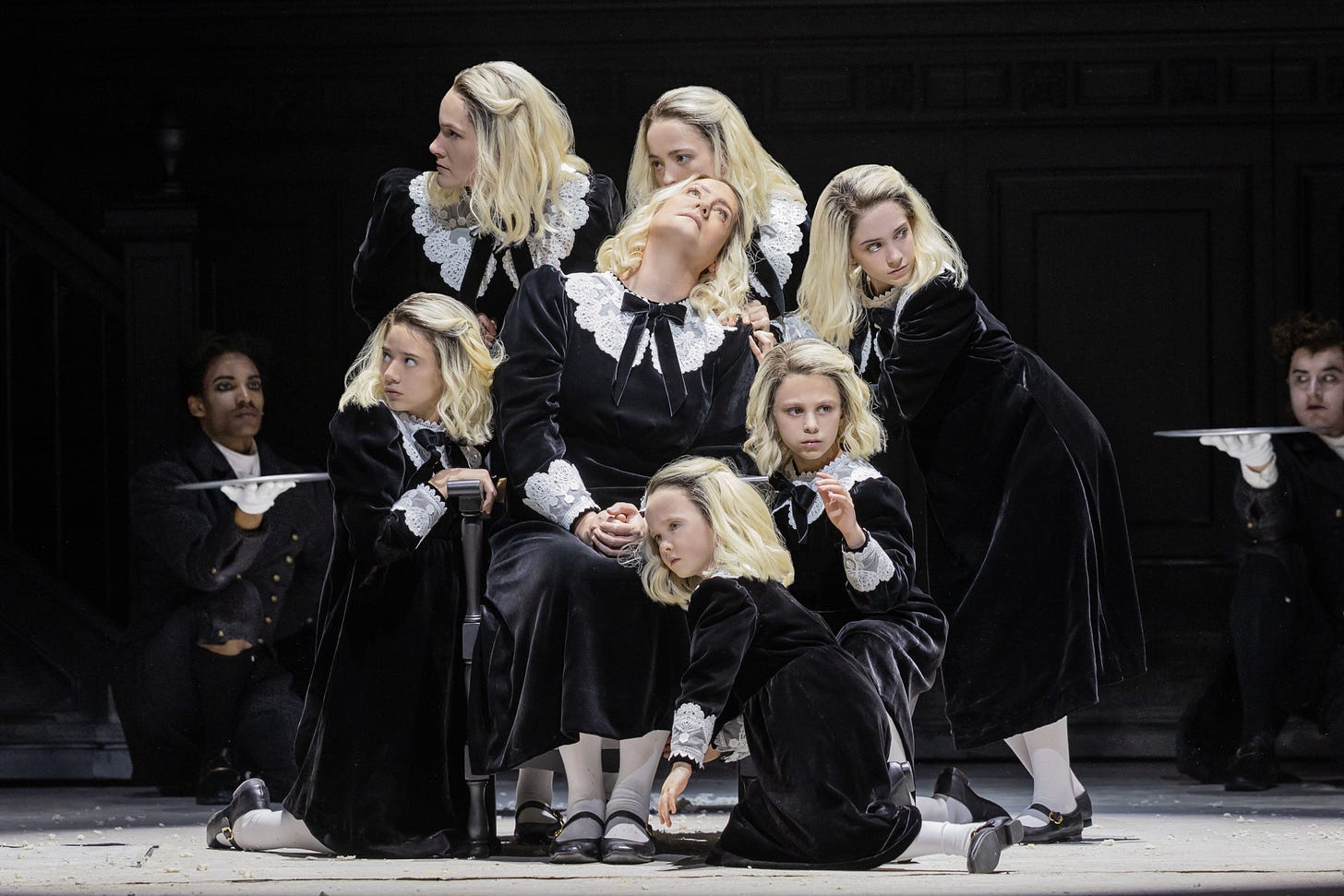
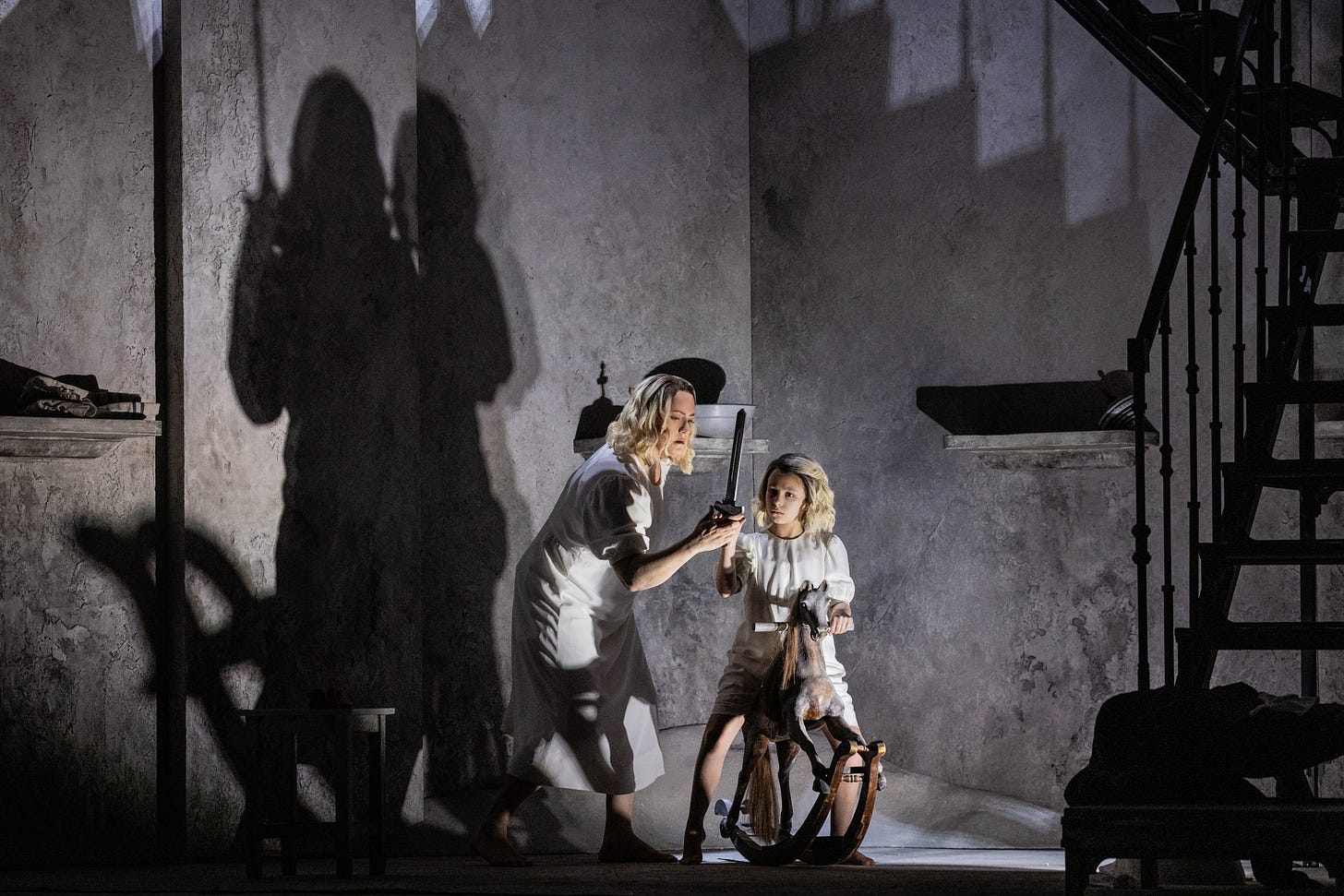
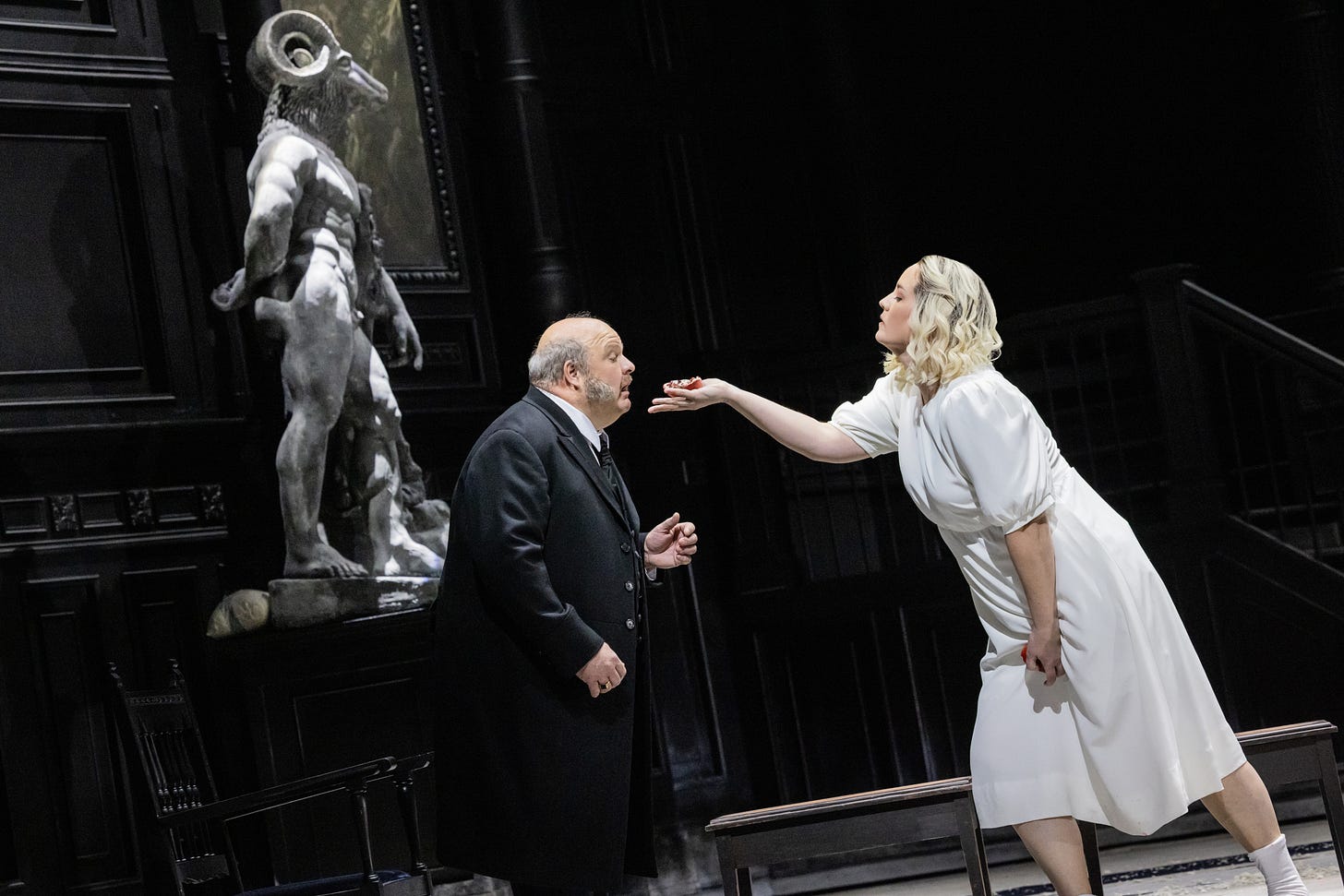
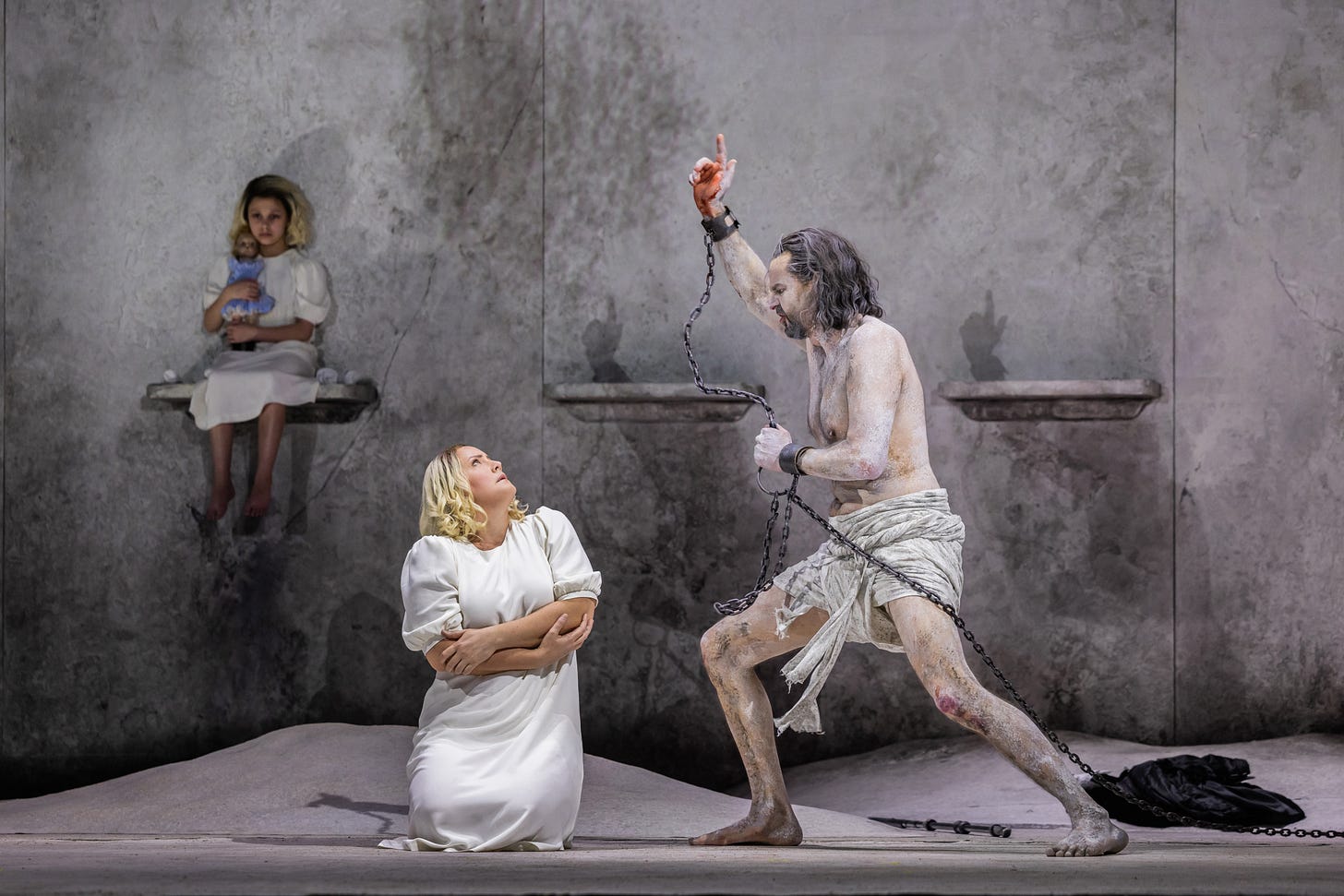

I was in the house for yesterday’s performance, the 3rd one I’ve seen in this run. I’ve liked it better each time I’ve seen it and while Guth takes the libretto much the way New Yorkers take traffic signals - they’re mere suggestions - he creates such a compelling version that it works. I’m still puzzling over the ending. I want her to be following Jochanaan’s instruction to go to the desert to seek the Son of Man, but I’m not sure that’s what’s happening.